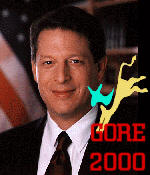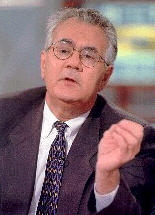 |


Vice President-as-Candidate Comes Under New Pressure 'Don't Ask, Don't Tell' Fast Becoming an Election Issue |
Frank made his comments in an interview Saturday on The Signorile Show, an online radio program hosted by gay author and columnist Michelangelo Signorile, on the GAYBC Radio Network. "I know there's this sense that 'Oh well, the Vice President is not supposed to disagree with the President.' I think that's wrong," said Frank. "I think as a Presidential candidate, he's fully entitled to give his position which I hope will be that it's a mistaken policy."
Frank's suggestion that Gore now oppose "Don't Ask, Don't Tell" could put the Vice President on the spot with gay voters, who are expected to prove important in several Democratic primaries. "The gay vote will provide a critical margin in a number of primaries, and also in the general election," Signorile said. "Particularly here in New York, Mrs. Clinton's statement --combined with the recent headlines on this issue – has turned it into almost a litmus test for gay and progressive voters." Candidates Bradley and Gore have been competing intensely over recent months for the gay vote. Both have made appeals before gay audiences, visited with gay organizations, and sought financial and volunteer support from gays nationwide. While Bradley supports more sweeping gay rights proposals than does Gore, the vice president has embraced the community while in office, and recently appointed a lesbian rights activist as manager of his presidential campaign On the issue of gays in the military, Bradley has opposed the current policy since 1993, when he supported an amendment that would have prevented "Don't Ask, Don't Tell" from being codified into law. Bradley advertises this position on his campaign website, where he none-too-subtly refers to the current policy as "the Clinton-Gore endorsed discriminatory policy of 'Don't Ask, Don't Tell.'"
 For his part, Vice President Gore has attempted to distance himself from the
military's behavior under the policy while maintaining support for the
policy itself.
For his part, Vice President Gore has attempted to distance himself from the
military's behavior under the policy while maintaining support for the
policy itself.
Last summer, Gore suggested a "more compassionate" enforcement of existing policy, but has stopped far short of the harsh criticism made this weekend by the policy's creator, President Clinton. In suggesting that Gore separate himself further from his administration's record on the issue, Frank went as far as to compare Gore's situation to that of former Vice President Hubert Humphrey. "I know there's this sense that 'Oh well, the Vice President is not supposed to disagree with the President.' I think that's wrong," said Frank. "I think that Hubert Humphrey paid a price in 1968 because he delayed making clear his differences with Lyndon Johnson over Vietnam." Among Republican contenders for the Oval Office, George W. Bush and John McCain support the current policy. The remainder of GOP candidates advocate barring gays from serving in uniform. |


